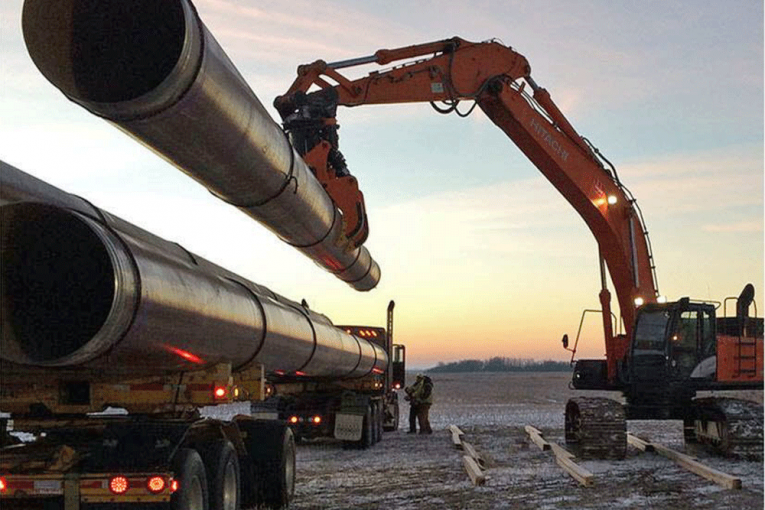
CALGARY – TC Energy Corp. has been moving a record amount of natural gas through the United States which is mired in a deep freeze that has caused a spike in commodity prices and also roiled the country’s power markets.
“During the polar vortex that covered most of the U.S. over the past week, we experienced unprecedented sustained demand for our pipeline capacity as we set a record for coincidental three-day peak deliveries of over 101 billion cubic feet per day,” TC Energy president and CEO Francois Poirier said Thursday, adding those volumes were roughly two per cent, or 2 bcfd, higher than the company’s previous record.
Poirier said the company’s employees in Texas kept the pipelines flowing despite “trying personal circumstances.”
The company’s own pipelines performed “extraordinarily well” in the U.S. deep freeze, even though many of the company’s employees in Houston “worked most of the past week without water or electricity in their homes,” said Stanley Chapman, TC Energy’s executive vice-president, U.S. and Mexico natural gas pipelines.
Still, the company declared a “force majeure” as it needed to park some natural gas in its system because customers, including industrial clients, didn’t have power and couldn’t take TC Energy’s natural gas deliveries.
Unseasonably cold weather has blanketed the U.S. this week, roiling power markets in warm-weather states such as Texas and Oklahoma, and causing record-setting spikes in natural gas prices.
Supply for next-day delivery at the Oneok Gas Transportation hub in Oklahoma traded at US$1,250 per million British thermal units on Wednesday, David Hoy, a trader at Dynasty Power in Calgary, told Bloomberg. That’s up from US$999 on Tuesday, and just US$9 a week ago.
Millions of Texas residents have been dealing with rolling power outages throughout this week and are now facing boil-water advisories.
IHS Markit estimates that Canadian natural gas producers are shipping 25 per cent more gas to the U.S. in the middle of the deep freeze, with deliveries rising to 7.5 bcfd up from about 6 bcfd last month and 5.6 bcfd in December.
TC Energy shares traded up by nearly 1 per cent, on Thursday to $57.10 per share after the company posted announced that its net earnings stood at $1.1 billion in the fourth quarter, exactly equal to the company’s earnings from the same quarter a year earlier.
Calgary-based TC Energy owns Canada’s largest network of natural gas pipelines and an extensive gas pipeline network in the U.S. that extends from gas-rich Pennsylvania and Ohio to the southern states of Louisiana and Oklahoma, allowing the company to move huge volumes of natural gas, which is used for both home heating and in electricity generation, into and around the U.S.
The company has also been trying to expand its oil pipelines business in recent years with the US$14.4-billion Keystone XL pipeline project, which saw its presidential permit revoked by U.S. President Joe Biden. The company warned Thursday that it would book a “substantive” write down for the project that would have carried 830,000 barrels of oil per day from Alberta to the U.S. Gulf Coast.
The company said it will asses its options regarding Keystone XL with its partner, the Government of Alberta, and other stakeholders. Some analysts believe the company is interested in walking away from the project but Alberta Premier Jason Kenney has repeatedly said the province is interested in legal challenges.
Poirier said Thursday the company was looking for a “more diversified” asset mix going forward and would prioritize some of its spending into its power and storage businesses in the future.
Stifel FirstEnergy analyst Ian Gillies said in a research note Thursday that the carrying value of Keystone XL is currently $2.8 billion but the size of the writeoff will depend partly on recovering some of the project costs from oil companies including Suncor Energy Inc. and Cenvous Energy Inc., which have already announced $142 million and $100 million write downs on the project, respectively.
In total, Gillies said he expects oil companies’ provisions to Keystone XL will total $360 million.
The other offsetting factor for TC Energy’s Keystone XL writedown is the Alberta government’s contribution, since the provincial government “paid the bulk of Keystone XL costs in 2020,” Gillies wrote.
In addition to Keystone XL, TC Energy has faced fresh challenges on another major growth project, the $6.6-billion Coastal GasLink pipeline, which would carry 2.1 bcfd of natural gas from northeast B.C. to the under-construction LNG Canada export terminal in Kitimat.
At the end of Dec. 2020, British Columbia’s health authority issued a new order to restrict the number of workers on sites for industrial projects in the province due to COVID-19, and companies must submit work re-start plans with the provincial health officer to resume work on sites – which is expected to inflate costs for Coastal GasLink.
“We’re working with the provincial health authority to resume work on the project,” Poirier said, without disclosing new cost estimates.
Some of the additional costs of Coastal GasLink could be recovered in final pipeline tolls, the company said, and also warned that the “schedule will be delayed.”
• Email:
You can read more of the news on source
